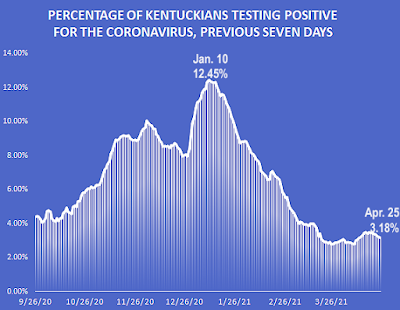 |
| Kentucky Health News chart from state Dept. for Public Health data; dates are beginning of weeks. |
By Al CrossKentucky Health News
Kentucky used less than 40 percent of the coronavirus vaccine doses it received in the last week, and the number of vaccinations declined for the second week in a row.
Those numbers stood out more than those on the daily pandemic report, which showed slight increases in new cases and the positive-test rate.
Gov. Andy Beshear's daily press release emphasized vaccination, announcing that 1,732,791 Kentuckians had received at least their first dose of a vaccine.
“Every day, we get a step closer to reaching the 2.5 million-vaccine Team Kentucky Vaccination Challenge and ending this pandemic once and for all,” Beshear said.
The governor has said he would lift all capacity restrictions once 2.5 million Kentuckians have gotten at least one dose of vaccine. On Monday, when he largely lifted his mask mandate for vaccinated people who are outdoors, he noted that vaccinations are slowing and "We will probably do things more incrementally."
The state's daily vaccine report showed that in the reporting week that ended Monday, about 59,000 Kentuckians got a first dose. That was 31 percent less than the approximately 85,000 the previous week, and less than half the 125,000-plus in each of the two weeks before that.
The previous week, the state used 54% of the doses it received. Last week, it used only 39%, though supplies were slightly lower because of the pause in shipments of the Johnson & Johnson one-dose vaccine.
Because the other two vaccines require two doses, the J & J vaccine has been the most popular, but now experts and officials fear it will be in less demand because of the very rare blood clots that led to the pause. The vaccine now carries a warning label for women of childbearing age.
The decline in vaccine demand has prompted many vaccination sites to take walk-in patients, not just those with appointments.
“There are now more options than ever for you to sign up for your shot of hope,” Beshear said. “It’s fast, it’s easy and it will help us save lives and get back to more of the activities we’ve missed over the past year.”
The Centers for Disease Control and Prevention issued masking guidance similar to Beshear's. President Biden touted it, saying "If you're vaccinated, you can do more things more safely, outdoors as well as indoors. . . . This is another great reason to go get vaccinated now. Now!"
Daily numbers: The state reported 716 new cases of the virus, raising the seven-day rolling average by 16, to 538. The percentage of Kentuckians testing positive for the virus rose .02 percentage points, to 3.17%.
The state's daily rate of new cases over the last seven days is 10.47 per 100,000 residents, up .32. The national rate is 17, and Kentucky's rate remains 38th among the states, according to The New York Times.
Counties with rates more than double the statewide rate are in the northeast or along the Tennessee border: Lewis, 39.8; Bath, 37.7; Powell, 33.5, Morgan, 33.3; Montgomery, 32.5; Robertson, 27.1; Monroe, 25.5; Mason, 24.3; and Todd, 20.9.
The state added 17 more fatalities to its Covid-19 death toll, bringing it to 6,476. Ten were from regular health-department reports and seven were from the ongoing audit of death certificates.
The regularly reported deaths, all in April or March, were a Casey County woman, 73; a Clay County woman, 68; a Hopkins County woman, 50; a Hopkins County man, 84; a Jefferson County woman, 69; a Jefferson County man, 60; a Jessamine County woman, 75; a Kenton County woman, 77; a Pike County man, 76; and a Wayne County woman, 69.
The audit deaths, which ranged from August through January, were a Grayson County woman, 89; a Jefferson County woman, 86; a Jefferson County man, 75; a McCracken County man, 85; a Rockcastle County woman, 88; and two Whitley County women, 89 and 96.
In other pandemic news Tuesday:
- Counties with more than 10 new cases were Jefferson, 94; Fayette, 59; Boone, 30; Warren, 30; McCracken, 24; Daviess, 23; Hardin, 21; Oldham, 21; Madison, 20; Christian, 18; Bullitt, 15; Barren, Harlan and Montgomery, 13; and Pike, 12.
- Beshear visited the main UPS global air hub in Louisville "to highlight the role Kentuckians are playing in distributing coronavirus vaccines throughout the nation to save lives and end the pandemic," a release from his office said. It quoted Beshear: “In a week when a lot of the world has their eyes on Kentucky and one of our signature industries – Thoroughbred racing – and on our culture, sports and hospitality, this seemed a perfect time to visit a major employer in the commonwealth that is doing so much to help this country win the war against Covid.”
- The Washington Post reported on its poll with ABC News: "While 10 percent of Democratic respondents said
they’re unlikely to get the shot, 40% of Republicans gave that response. But Republicans' age appears to play a big role in
how they view vaccines: 20% of Republican seniors said they won’t get the shots; that rises to 40 percent of Republicans ages 40 to 64, and 55% of Republicans ages 18 to 39. Age is a less salient factor among Democrats who
are hesitant. Three percent of seniors are hesitant, compared with 14 percent
of those under age 40."













